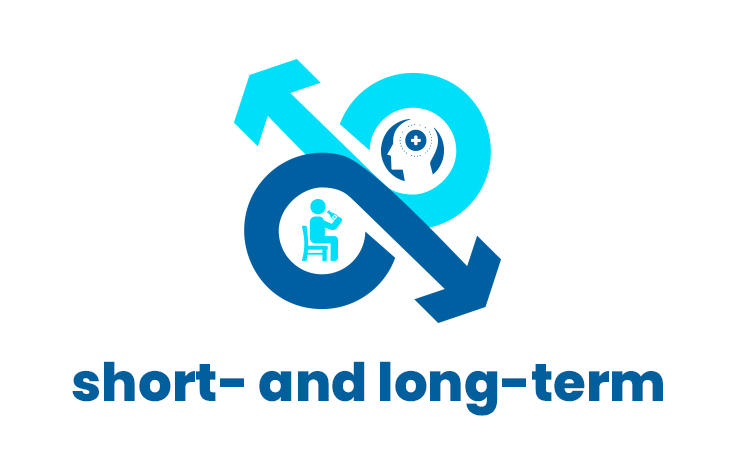Mental Health illness refers to a wide range of conditions affecting mood, behavior, and thinking. The term includes substance use disorder, eating disorders, and other process addictions.
Everyone has moments of feeling down, confused, or fearful. People with a mental disorder experience their symptoms all the time without relief until the problem is discovered and treated. Unfortunately for some people, the correct treatment doesn’t come until their illness has already impacted their life in significantly negative ways.
The term “co-occurring disorder” is often used in discussions about alcohol or drug addiction. That’s because people with a mental illness are at a higher risk of developing a substance use disorder (SUD) than those without mental illness.
It’s estimated that 9.2 million adults in the U.S. have a co-occurring disorder, otherwise known as dual diagnosis (more than one mental illness, including addiction). That’s because people with a mental illness are at a higher risk of developing a substance use disorder (SUD) than those without mental illness. The most common mental health disorders with addiction are anxiety, depression, PTSD, and personality disorders.
In many cases, mental disorders go undiagnosed or untreated until the individual enters an addiction treatment facility and receives a complete evaluation of their physical and mental health. However, though the problems are related, it should not be assumed that one issue causes the other.
Reasons for Co-Occurring Mental Disorders
Research has found there are at least three possibilities to explain why so many people experience both a mental health and substance use disorder at the same time.
1. Common Risk Factors
Both mental health problems and addiction can run in families. This suggests certain genes may put individuals at higher risk of developing either a SUD, mental health disorder, or both.
2. Mental Health and Substance Use
Mental health issues may lead to substance use. People suffering from depression, anxiety, and PTSD are most likely to experiment with drugs or alcohol to relieve their symptoms. In addition, the brain chemistry of people with mental illness may increase the pleasurable effects of some medications, making it more tempting to use again and again.
3. Substance Use May Increase Risk
Substance use disorders can cause changes in the brain that lead to the development of mental health problems.
What Are the Most Common Mental Health Disorders with Addiction?
While mental health disorders and substance use disorders are a common combination, the Substance Abuse and Mental Health Services Association reports that no specific mental issues are seen more frequently than others in conjunction with addiction. However, some of the most commonly diagnosed mental health problems include:
- Anxiety and mood disorders
- Attention deficit disorder
- Bipolar disorder
- Personality disorders
- Post-traumatic stress disorder
- Schizophrenia
SUDs and issues with mental health are best when treated together. Making an accurate mental health diagnosis is almost impossible while the patient is still using drugs or is in the process of detoxing. Many symptoms of drug or alcohol intoxication or withdrawal mimic the symptoms of mental illness. Treatment for SUDs must be tailored to address any co-occurring mental disorders.
Personality Disorder
A personality disorder is typically defined as having an unhealthy or strictly rigid way of thinking and behaving. Individuals with this type of disorder may have trouble relating to people, which can cause problems in relationships and may limit the person’s social activities.
In most cases, personality disorders begin during the teen years or early in adulthood. Many people don’t realize they have a disorder because to them, their way of thinking and behaving seems perfectly natural. They may blame others for being difficult.
The types of personality disorders are separated into three clusters. Each type within the cluster shares similar characteristics.
Cluster A
Cluster A disorders are defined by eccentric behavior, paranoia, or an inability to read social cues. The three types of conditions in Cluster A include schizotypal, paranoid, and schizoid personality disorders.
Cluster B
Cluster B disorders are characterized by behavior that is overly dramatic or emotional. Some types within Cluster B may exhibit a lack of impulse control and violent behavior. There are four types in Cluster B, narcissistic, histrionic, anti-social, and borderline.
Cluster C
Cluster C disorders cause fearful thinking and behavior. Types within this cluster include dependent, avoidant and obsessive-compulsive. People with a Cluster C diagnosis may appear extremely shy, rigid, or too concerned with the opinion of others.
Anxiety Disorders
Feeling anxious is a normal part of life, but for people with anxiety disorders, the uncomfortable feelings don’t go away and get more intense with time. The National Institute of Mental Health divides anxiety disorders into a generalized anxiety disorder, panic disorder, and phobia-related disorders. In all cases, the symptoms can interfere with relationships, careers, education, and daily life.
Generalized Anxiety Disorder
People with a generalized anxiety disorder or GAD worry excessively over everyday occurrences. Their fears are so intense that they may not cope with day-to-day activities, such as paying bills or going to a class.
Symptoms include feeling restless, tense, and irritable, and having difficulty concentrating. Sleeping problems and living in an almost constant state of worry cause physical exhaustion, making it even more difficult to cope with everyday stressors.
Panic Disorder
Panic attacks are the hallmark of panic disorder. Panic attacks are bouts of intense fear that come on suddenly and reach a peak within minutes. They can be accompanied by health palpitations, trembling, feelings of doom, and shortness of breath.
Attacks may be triggered by specific events or come from nowhere. Worrying about when an attack will happen may cause some people to avoid going out into public or interact socially. Isolation can then lead to other mental health problems like depression or agoraphobia.
Phobia-Related Disorders
A phobia is an intense aversion to an object or situation. Fear can be a helpful reaction to a dangerous situation, but people with a phobia-related disorder have fears that are irrational or out of proportion to reality. For example, a person with separation anxiety phobia may fear dying if separated from one of their attachment figures (a person, pet, or place). They may exhibit physical symptoms just by talking about or anticipating separation. Other symptoms of phobia-related disorders are:
- Trembling or shaking
- High blood pressure
- Dry mouth
- Rapid speech or inability to speak
- Nausea
- Shortness of breath
These symptoms can vary in severity and occur when someone with a phobia-related disorder faces the situation or object of their fear.
Bipolar Disorder
Formerly known as manic depression, bipolar disorder is a condition that causes extreme mood swings. People with this disorder will experience mania or a manic stage with emotional highs and a depression stage with emotional lows. Episodes may occur multiple times in a year or not appear for many years.
Children and teens are at risk for developing bipolar disorder. It can be difficult to diagnose people in this age group because the normal highs and lows of adolescence may mask more serious symptoms.
Symptoms of a mental health issue within the spectrum of bipolar disorder include:
- Being unusually happy or upbeat
- Sleeplessness
- Talkativeness
- Racing thoughts
- Being easily distracted
- Feelings of euphoria
- Poor decision making
- Depression
- Loss of interest in hobbies and activities
- Loss of energy
- Low self-esteem
- Inability to concentrate
- Planning or thinking about suicide
If you or someone you know is exhibiting signs of bipolar disorder, seek help immediately. The cycle of severe depression puts sufferers at high risk for suicide.
Post-Traumatic Stress Disorder (PTSD)
PTSD is most commonly thought of as a mental health issue affecting soldiers and others who have been in combat situations. While it is a major mental health issue that affects military veterans, it is not a condition exclusive to those who’ve served in the military.
Anyone who has gone through a traumatic event such as sexual assault, violent crime, or abuse can develop post-traumatic stress disorder.
Symptoms of PTSD include:
- Intrusive memories or “flashbacks”
- Avoid people, activities, or places that remind them of the triggering event
- Negative self-thoughts
- Hopelessness
- Problems with memory, especially remembering key aspects of the trauma
- Changes in sleep patterns
- Being easily startled
- Frightening dreams
- Re-enacting the trauma or aspects of it through play (seen in children)
Symptoms of PTSD typically become more intense with time if the disorder is untreated. Getting treatment as soon as you suspect a problem will help prevent symptoms from becoming more severe and life-altering.
While people with a mental illness are rarely violent towards others, having a mental illness puts individuals at a higher risk for suicide and other types of self-violence. Don’t hesitate to reach out on your own behalf or on behalf of someone you care about if they exhibit any of the symptoms of mental illness. Even if they are currently using alcohol or drugs, treatment and recovery is possible.
Finding Help for the Most Common Mental Health Disorders with Addiction
Seeking treatment for an alcohol or drug addiction is an important first step in relieving the symptoms of a mental health disorder. After completing detox in a qualified treatment facility, your medical team will be able to accurately diagnose whether or not you have a mental illness. Call The Haven today to learn more about treating the common mental health disorder with addiction.











